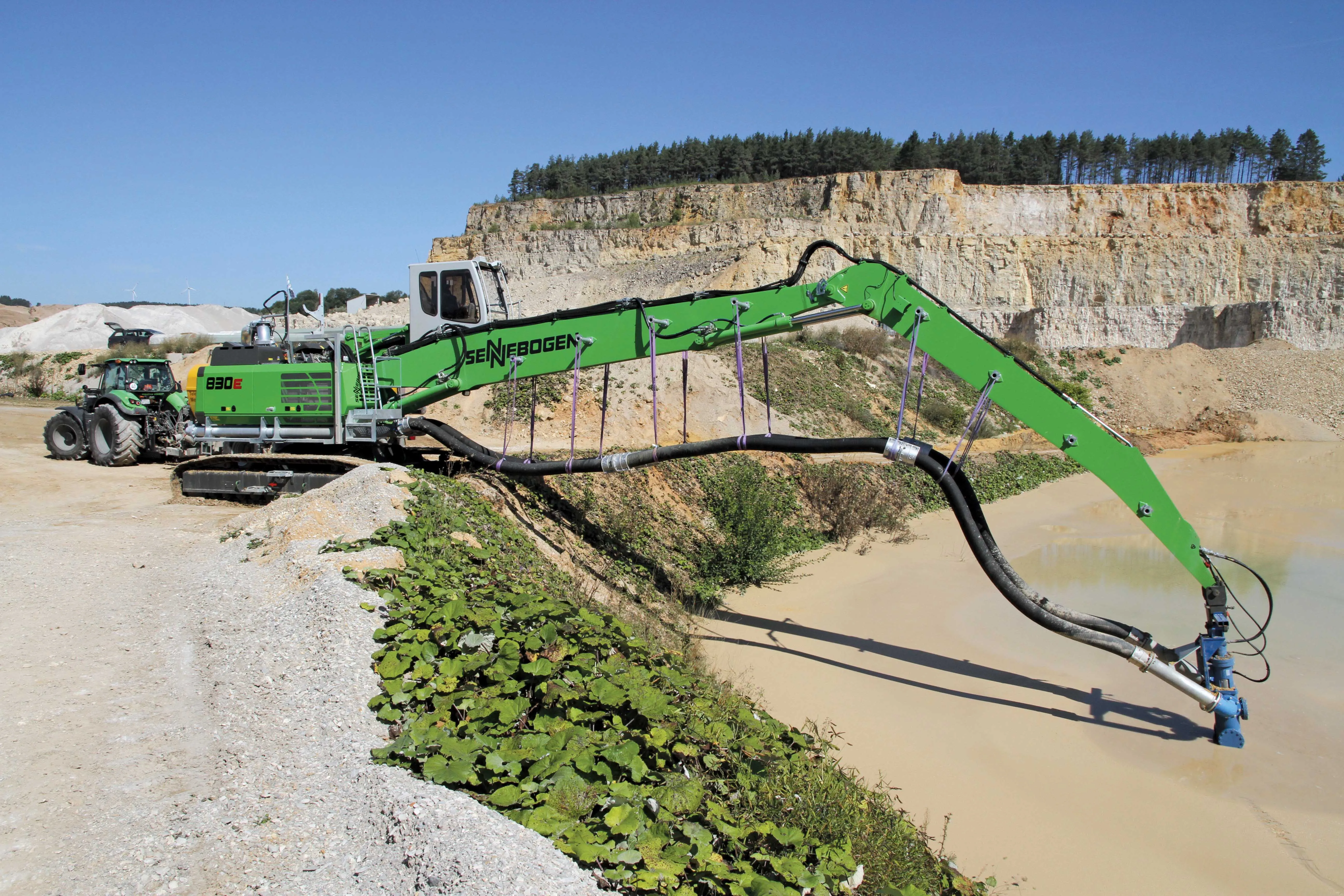Since 1942, the company Hermann Trollius has been processing limestone and dolomite in the Bavarian town of Lauterhofen and refining it for agricultural use, as well as in the building and industrial sectors.
Trollius is now for the first time using residue from washing crushed dolomite, thanks to a Sennebogen material handler. The oft-discarded viscous mass is pumped out and then used as fertiliser. Manager Hermann Trollius - the third generation to run the family-owned company of 60 employees - says th
January 4, 2016
Read time: 3 mins

Since 1942, the company Hermann Trollius has been processing limestone and dolomite in the Bavarian town of Lauterhofen and refining it for agricultural use, as well as in the building and industrial sectors.
Trollius is now for the first time using residue from washing crushed dolomite, thanks to a2924 Sennebogen material handler. The oft-discarded viscous mass is pumped out and then used as fertiliser. Manager Hermann Trollius - the third generation to run the family-owned company of 60 employees - says that he constantly strives to combine tradition and modern methods to create value for man and nature; It's “total resource utilisation", he says.
Washing the crushed dolomite rock produces a slurry by-product composed of extra-fine dolomite dust. This mixture of water and dust, which previously had no use and was dumped in large quantities, is now included in a natural recycling loop as fertiliser.
"We've been looking for a way to use valuable raw dolomite material for a long time,” he says. “Limestone has been used as fertilizer for a while now – why not use the dolomite slurry in the same way? After extensively sampling and testing slurry extraction, we decided to implement the project professionally. The solution ultimately was to use a Sennebogen material handler with a powerful suction pump."
A progressing cavity pump moves the material through a pipe and into a conventional manure tank. The dolomite is ultimately taken out to the fields where it is sprayed as manure.
The Sennebogen 830 crawler, provided and supported by sales and service partner IBS Baumaschinen Service, is the carrier for the progressive cavity pump and extensive piping. The machine houses the pump drive and the controller for the tube arm. The hose lines and piping were largely developed and constructed by Trollius. The Sennebogen material handler has a crawler undercarriage and 164kW diesel engine that would usually be used at scrapyards or ports. The deciding factor for choosing the Sennebogen 830 was its 17m reach for positioning the pump at the edge of the landfill basin. With this solution, operator Bernd Kuhn has centralised control of all components and an ideal view of the pump and work area from the Maxcab comfort cab, which can be extended up to 2.7m.
It takes just four minutes to fill the manure tank, which has been driven into the quarry several times a day for the past several weeks by contractor Tobias Guttenberger. It is then taken to the surrounding fields where the liquid dolomite dust is sprayed as fertiliser.
With a particle size of just 0.007mm, the dissolved dust is 10 times thinner than a human hair, allowing it to penetrate the soil in the form of fertilizer and also be absorbed directly by plants.
Guttenberger is also putting his money on the pale yellow liquid for manure refinement. A mixture of only 10% dolomite to manure reduces the odour of manure dramatically.
Trollius is now for the first time using residue from washing crushed dolomite, thanks to a
Washing the crushed dolomite rock produces a slurry by-product composed of extra-fine dolomite dust. This mixture of water and dust, which previously had no use and was dumped in large quantities, is now included in a natural recycling loop as fertiliser.
"We've been looking for a way to use valuable raw dolomite material for a long time,” he says. “Limestone has been used as fertilizer for a while now – why not use the dolomite slurry in the same way? After extensively sampling and testing slurry extraction, we decided to implement the project professionally. The solution ultimately was to use a Sennebogen material handler with a powerful suction pump."
A progressing cavity pump moves the material through a pipe and into a conventional manure tank. The dolomite is ultimately taken out to the fields where it is sprayed as manure.
The Sennebogen 830 crawler, provided and supported by sales and service partner IBS Baumaschinen Service, is the carrier for the progressive cavity pump and extensive piping. The machine houses the pump drive and the controller for the tube arm. The hose lines and piping were largely developed and constructed by Trollius. The Sennebogen material handler has a crawler undercarriage and 164kW diesel engine that would usually be used at scrapyards or ports. The deciding factor for choosing the Sennebogen 830 was its 17m reach for positioning the pump at the edge of the landfill basin. With this solution, operator Bernd Kuhn has centralised control of all components and an ideal view of the pump and work area from the Maxcab comfort cab, which can be extended up to 2.7m.
It takes just four minutes to fill the manure tank, which has been driven into the quarry several times a day for the past several weeks by contractor Tobias Guttenberger. It is then taken to the surrounding fields where the liquid dolomite dust is sprayed as fertiliser.
With a particle size of just 0.007mm, the dissolved dust is 10 times thinner than a human hair, allowing it to penetrate the soil in the form of fertilizer and also be absorbed directly by plants.
Guttenberger is also putting his money on the pale yellow liquid for manure refinement. A mixture of only 10% dolomite to manure reduces the odour of manure dramatically.







